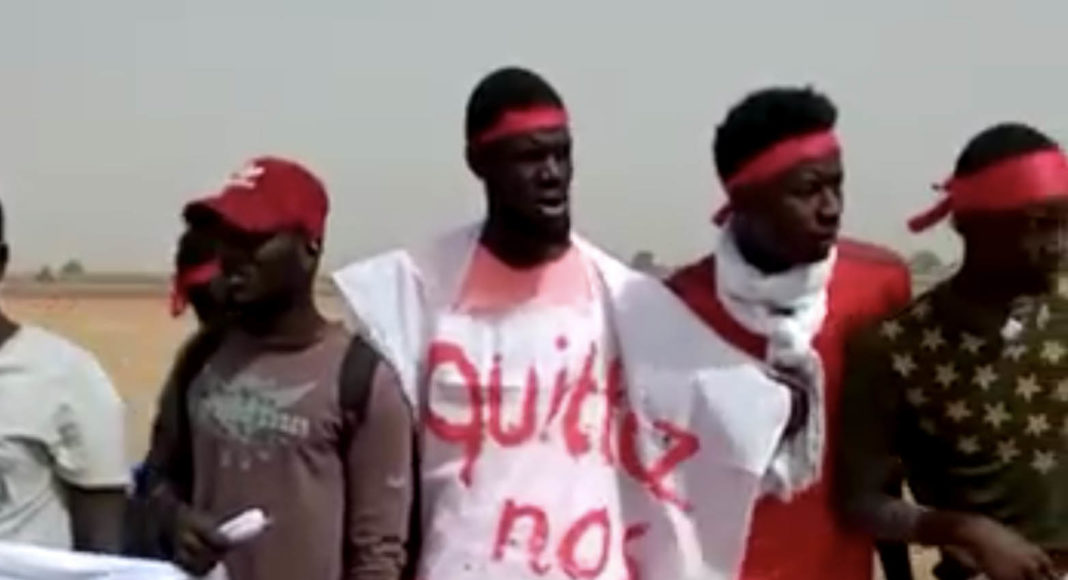By Houleye Thiam
Black Mauritanians have historically been stripped of their land ownership rights, most notably beginning in the 1980s when a new law provided a legal basis to confiscate their land and redistribute it to Beydanes (lighter skins Arab Mauritanians) and others [i].
This land grabbing system of laws, built on structural racism still occurs today and creates what is called in French, “l’esclavage foncier,” or land slavery in English. Land slavery is the pattern of the government taking land away from Black Mauritanians and giving it to Beydanes, and then the Beydanes employing or enslaving the Black Mauritanians to work the land they previously owned.
Despite a program to compensate those who lost their land as a result of government development policies, very little land has been redistributed, and the Mauritanian government has not taken any steps to get Black Mauritanians involved in this process of developing their lands or in the conversation about land development and compensation.[iii]
Mauritanian human rights activists, and local human rights organizations, report that local authorities still to this day, allow Mauritanian Beydanes or Haratins to take over land that is occupied by Black Mauritanians (Fulani, Soninkes, and Wolofs), and sometimes to even block their access to water sources.[iv] The land grabbing issue has created an emergence of several protests by Black mostly Fulani Mauritanians in the south have been the biggest victims of land grabbing in Mauritania.
Actions of the Mauritanian government
In 2020 the Mauritanian government granted thousands of hectares of land concessions to Arab investors along the Senegalese River regions. Furthermore, land that had been taken away from Black Fulani Mauritanians, was also sometimes given to Haratani Mauritanians.
This conflict of land grabbing often is between repatriated, former Fulani Mauritanian refugees that were deported to Senegal in the 1990s and brought back to Mauritania in 2011, and Black Arab Mauritanians former slaves also known as Hartani and Mauritanians Beydanes and local Beydane authorities all levels of the government.
From 2011-2021, multiple Black Mauritanian villages populated mostly by Fulani’s in the southern part of Mauritania, have been victims of land grabbing laws by the government, these villages were Boghe, Darel Barka, and now MBagne/Feralla, and this is an ongoing crisis.
In August of 2020 some 9,200 people who inhabited the Brakna region of Dar el Barka in southern Mauritania demonstrated for several days against the state granting their grain-growing land to an Arab investor from the Gulf. During a demonstration, their spokesperson, Abdourahamane Ly, reaffirmed the people’ attachment to their land, during a demonstration he stated, “rhese 3200 ha of land belong to us. There is no question of someone coming from elsewhere to do what they want with it, without our consent. People must be consulted and asked for their opinion. We are in a country of law.”
During this time, the forum of associations for the defense of human rights provided support and endorsed the demonstrators of Dar el Barka as to make a project of this kind succeed, there are essential prerequisites explained the president of Fonadh, Mamadou Sarr.
The resurgence of land grabbing in 2021
In early 2021, we have once again witnessed a new wave of land grabbing in the southern part of Mauritania, especially in the villages of Mbagne and Ferala, where Black Mauritanian residents of Mbagne and Ferala organized a peaceful protest on February 22, 2021, to raise awareness about the land grabbing issue.
Land grabs have devastating consequences for Black Mauritanians, as it displaces them often out of the country, and successful land grabs force entire populations and villages into poverty and starvation.
In addition to humanitarian concerns, land grabbing has the potential to drive civil unrest and conflicts between Arab and Black Mauritanians.
Cherif Ba, a native of Mbagne shared this during a recent protest in Feralla: “This rush for our lands is an ongoing process and part of the government’s agenda to Arabize the country, and further violate human rights for Black Mauritanians”.
As Human Rights Organizations and Activists, we are calling on the international community including the United States and United Nations to:
1. Call on the Mauritanian government to immediately cease the practice of land grabbing/
land slavery to prevent conflict and humanitarian crisis.
2. Encourage the Mauritanian government to pass and enforce laws that outlaw the practice
of land grabbing/land slavery.
3. Encourage mediation and peaceful conflict resolution related to the new wave of land
grabbing.
4. Offer protection and compensation to Mauritanians who have been forced out of the country due to this
practice.
5. To get landowners involved in the process of land development and cultivation, and contract negotiation with foreign nationals.
6. To urge the Mauritanian government to protect and respect land rights and human rights
References:[i]Human Rights Watch, “Ethnicity, Discrimination, and Other Red Lines Repression of Human
Rights Defenders in Mauritania,” Human Rights Watch, February 12,
2018, https://www.hrw.org/report/2018/02/12/ethnicity-discrimination-and-other-red-
lines/repression-human-rights-defenders.
[ii]Human Rights Watch, “Ethnicity, Discrimination, and Other Red Lines Repression of Human
Rights Defenders in Mauritania,” Human Rights Watch, February 12,
2018, https://www.hrw.org/report/2018/02/12/ethnicity-discrimination-and-other-red-
lines/repression-human-rights-defenders.
[iii]U.S. Department of State, Bureau of Democracy, Human Rights and Labor,
“Mauritania,” Country Reports on Human Rights Practices for 2018, U.S. Department of State,
2018, https://mr.usembassy.gov/wp-content/uploads/sites/204/Mauritania-2018-Human-Rights-
Report.pdf.
https://www.tellerreport.com/news/2020-08-23-thousands-of-mauritanian-peasants-take-
[iv]U.S. Department of State, Bureau of Democracy, Human Rights and Labor,
“Mauritania,” Country Reports on Human Rights Practices for 2018, U.S. Department of State,
2018, https://mr.usembassy.gov/wp-content/uploads/sites/204/Mauritania-2018-Human-Rights-
Report.pdf.[v]https://eiti.org/mauritania#:~:text=Mauritania%20has%20rich%20deposits%20of,is%20found
%20primarily%20at%20Akjoujt
[vi]https://carnegieendowment.org/2020/08/06/mauritania-s-economic-and-social-ambitions-
collide-story-of-diawling-park-pub-82424
[vii]https://carnegieendowment.org/2020/08/06/mauritania-s-economic-and-social-ambitions-
collide-story-of-diawling-park-pub-82424
[viii]https://www.tellerreport.com/news/2020-08-23-thousands-of-mauritanian-peasants-take-


